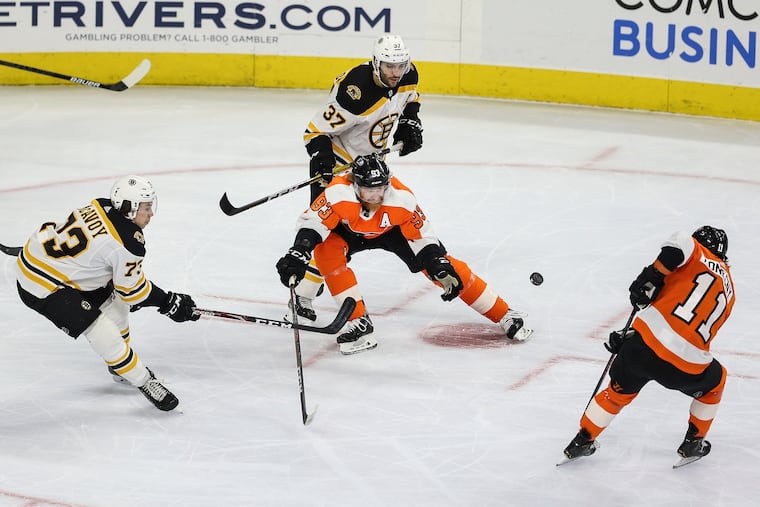The Flyers’ shot at a Stanley Cup is now in jeopardy, thanks to a vile little bug of an opponent | Mike Sielski
The coronavirus epidemic has interrupted the best and most enjoyable Flyers season in a long time. The scene at the team's last game proved as much.

To understand how we reached the point that the coronavirus could shut down the NHL season — to understand how the story about a virus acted exactly like a virus, changing and mutating and evolving at remarkable speed — you have to understand what it was like Tuesday night at the Wells Fargo Center.
What was it like? It was normal, mostly. It was thousands of Flyers fans clad in orange and black and a few Boston Bruins fans here and there, all of them strolling the main concourse and taking hellacious bites of cheesesteaks and sidling up to bars. It was Gritty on parade throughout the game, as usual. It was players laughing, after the Bruins’ 2-0 victory, about having to maintain a six-foot halo of space between themselves and the media, about having to answer questions from a dais instead of in the locker room, about having to answer questions about the situation’s severity at all.
“I don’t think we really care about coronavirus the way other people do,” Flyers goaltender Carter Hart said that night. By 1:30 p.m. Thursday, of course, they were made to care. By then, the NHL’s board of governors had consulted with medical experts and decided to suspend the league’s season. So much for that veneer of invincibility that pro athletes like to keep up. So much for “It’s Philly, bro.”
This is not to pick on Hart or Flyers defenseman Shayne Gostisbehere, who delivered that second memorable aside. But it is to emphasize that we went from normalcy to something close to, and maybe beyond, chaos in a matter of hours. Contrast the scene and atmosphere in the Center for that Flyers-Bruins game to that of the 76ers-Pistons game the following night. There were fewer people. There were more empty seats. More information about the severity of the outbreak had been made available, and more people had taken in that information and acted accordingly. More of them had decided that attending a basketball game wasn’t worth the risk, however great or slight, of exposure to the virus.
But there was, I suspect, another factor at work. Just a theory here, but I would bet there were more people willing to risk going to the Flyers game than to the Sixers game, in part, because there were more people who really wanted to see the Flyers play. The Sixers have been a disappointment this season, arguably the biggest in the NBA, and even the return to the lineup of one of their stars, Joel Embiid, wasn’t enough to pull people out of their season-long frustration over the team, especially given the presence of a public- and personal-health threat.
The Flyers-Bruins game had a different context, different ancillary circumstances. The Bruins entered Tuesday atop the NHL’s standings, the league’s best team, perennially excellent, and the Flyers were rolling. They had won their previous nine games. There was Stanley Cup conversation at the office watercooler (before everyone was told to work from home), and such talk had been missing for the better part of a decade. The Flyers had been a moribund franchise, rebuilding for more than five years, and the optimism that this year’s team generated was a familiar sensation made fresh again. So here was, in that trite phrase, a “measuring-stick game,” and the prospect of the Flyers’ beating Boston, winning their 10th consecutive game, and vaulting over the Washington Capitals and into first place in the Metropolitan Division was a hell of a tractor beam for their fans.
You can call those people selfish and uninformed if you wish. But most of them aren’t on Twitter all day, getting second-by-second updates on the virus and its rippling effects. They’re living their lives, and human nature is a powerful force. So with even that brief passage of time, less than a day, it was hardly surprising to see the difference between the two settings. Around here, there was more enthusiasm about the Flyers than there was about the Sixers, and now there’s likely to be stronger disappointment over the NHL season’s stoppage. The reasons that the Flyers have gone 45 years without winning a Stanley Cup are too numerous to count, and maybe a global pandemic was just the next one on the list.
“We will continue to monitor all the appropriate medical advice,” NHL commissioner Gary Bettman said in a statement Thursday, “and we will encourage our players and other members of the NHL community to take all reasonable precautions — including by self-quarantine, where appropriate. Our goal is to resume play as soon as it is appropriate and prudent, so that we will be able to complete the season and award the Stanley Cup.”
That’s the goal. That’s the hope. There’s no telling whether it will be the reality. "The collective actions of private industry to suspend events, implement measures aimed at social distancing, will have meaningful impact on epidemiology of spread,” Dr. Scott Gottlieb, former head of the FDA, said Thursday on Twitter. “Business is leading the way on mitigation and social distancing, filling a void left by policy makers. But shutting down NBA games is not enough.”
If Gottlieb, who has been one of the most accurate and reliable voices on the epidemic, is right, shutting down NHL games won’t be enough, either. There’s a long road ahead yet to safety, to the resumption of normalcy, and this vile little bug doesn’t really care about anyone’s championship drought.